#mai kawakami
Explore tagged Tumblr posts
Text


「舞先輩!」 by ジャムペン | Twitter
๑ Permission to reprint was given by the artist ✔.
891 notes
·
View notes
Text

郁(IKU)
513 notes
·
View notes
Text

#ai girl#ai illustration#anime art#anime fanart#anime girl#cosplay#china dress#mai kawakami#Myriad Colors Phantom World
2 notes
·
View notes
Photo








Musaigen no Phantom World | Ep 11 | Since we don't know when you'll be back to normal, we'll have to do some shopping.
#musaigen no phantom world#myriad colors phantom world#haruhiko ichijou#mai kawakami#mcpwgifs#my gifs#my post
18 notes
·
View notes
Text
I made a custom thing for my Tomie dvd



#i'm really happy with how this turned out#and it's my favourite Tomie live action#live action tomie#tomie junji ito#tomie kawakami#anime live action#junji ito#fanart#dvd#manga#anime#horror#Mai Hosho#2000s movies#japanese movie#artist redraw
12 notes
·
View notes
Text



#persona#persona series#persona 3#persona 4#persona 5#Andre Laurent Jean Geraux#bebe persona 3#Andre Roland Jean Gérard#eri minami#sadayo kawakami#this may be the smallest poll thus far#and no p1 or two at that
8 notes
·
View notes
Text
I think there's a good amount of analysis capability w/ Tomie Kawakami & Gaston Legume lowk.
Capability that I cannot access rn in my current brain state... but like, the vague idea of it is:
Like Gaston is kind of exactly what Tomie would be if she were a man. And the difference of the roles they play in their respective narratives really emphasizes/demonstrates the fundamentality their genders have for their characters.
Like they're the Same Person but also each other's Natural Enemies.
(And like yea "Wow who would've thought that two characters that have themings of patriarchal criticisms & treatment of women & whatnot could have Comparisons or have Connections Drawn /sarc" but also. I mean. There's a venn diagram of batb fans & Junji ito fans and I wouldn't be surprised if i was the sole occupant. So notable this is also a bizarre connection. But SOMEONE has to do it and MY BRAIN has an OVERACTIVE PATTERN RECOGNITION FUNCTION. so here we are.)
#“girl no one gives a Fuck” my brain whispers at me for the 7 thousandth time as I'm on tumblr#but screw that this has to go SOMEWHERE#maybe one day ill do my study and write my thingie but for now#i scream into the void#Gaston#Tomie Kawakami#tomie junji ito#tomie#batb gaston#actually this may be applicable to 2017 Gaston too lowk??#idk i have.. research to do#batb#beauty and the beast#ramblez brambles
2 notes
·
View notes
Text

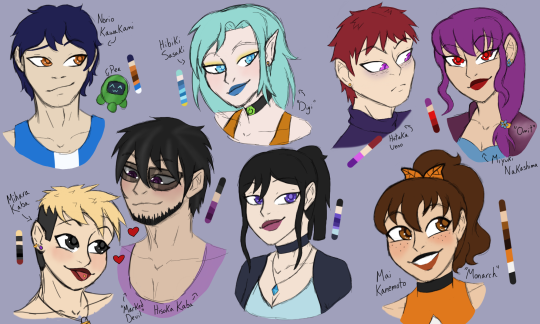
More of an update! This time, I've drown 2/3 of my BNHA OCs! I still have about 7 more that need re-visiting, but I'll get there... eventually XD
Also includes some doodles of To/mura Shiga/raki in an AU I have with a friend!
#art#my art#bnha ocs#bnha oc#original post#drift#kiyoko#kiyoko kaba#aya okumura#medusa on a string#asuka#sumire#riko#caffeine#norio#norio kawakami#mihara#hisoka#digi#hibiki#hotaka#mai#monarch#mai kanemoto#Miyuki nakashima#omit#mini smite#tomura#tomura shigaraki#shigaraki
8 notes
·
View notes
Text
does anyone have any french contemporary lit recommendations for enjoyers of elif batuman mieko kawakami carmen maria machado etc etc merci beaucoup
#j'ai lu hiver à sokcho de elisa shua dusapin & c'était pas mal mais je veux plus de lecture en francais et je sais pas comment le trouver#littérature#francais#french literature#contemporary literature#booklr#elif batuman#mieko kawakami#elisa shua dusapin#carmen maria machado#sally rooney#han kang#banana yoshimoto#rachel yoder#haruki murakami#an yu
2 notes
·
View notes
Text
Trying to finish Tomie and it’s a chore. She’s such a cunt, no wonder terfs love her 🙄
3 notes
·
View notes
Text
terms of address: maruki
I was asked how the squad refer to Maruki, so here goes.
first, the normies
Many of the cast refer to Maruki exclusively as "Dr. Maruki": 丸喜先生 Maruki-sensei. These mentions are universally in kanji.
Ann has 41 of these, and often uses sensei by itself;
Haru has 26 of these, and uses sensei alone a couple of times, during Maruki's Palace;
Makoto has 27 of these. She uses sensei alone quite often;
Yoshizawa has 41 of these total, 14 as Kasumi and 27 as Sumire. She calls Maruki just sensei often.
Noticing anything? Yeah: they're all the girls. These particular characters consistently seem to have relatively colourless and unmarked speech. This may in itself, of course, be a form of marking, since expectations around gendered speech in Japan can be so strong.
the relatively boring
Ren appears to always use "Maruki", apart from one instance very early on when an option, "Ask about the counsellor", includes Maruki-sensei. He also always uses kanji; protagonists don't have to be polite.
He calls Maruki sensei alone once, during his confidant. Kawakami gets it more often, while Takemi gets it constantly.
slightly more edgy
While Futaba always uses "Dr. Maruki", she slurs it a little, making it slangier: 丸喜せんせー Maruki-sensee. She always uses kanji for "Maruki", except in the text chat after he visits Shujin, where she's only heard his name spoken!—which is a cute detail. Occasionally she uses せんせー sensee by itself, which is distinct from her 先生 sensei meaning "a teacher".
Ryuji, again, virtually always makes it "Dr. Maruki", usually Maruki-sensei in kanji; a few mentions very early on, when they're still talking about the new counsellor guy, are just straight "Maruki". Also, in his counselling session, Ryuji almost just calls him that!—ultimately deciding to make it "Dr. Maruki":
Ryuji なあ、丸喜⋯センセーってよ、よく『変わってる』って言われね? naa, maruki... sensee tte yo, yoku "kawatteru" tte iwarene? Hey, Dr. Maru— ah, I mean, Doc. Anyone ever tell you you're kinda… not normal?
The meaning is a little lost in translation here, with Ryuji cutting from the normal form of address to a nickname. Also, in Maruki's Palace, he recognises Maruki on one of the videotapes, and starts off in hiragana before finishing in kanji. It feels a bit as if he isn't initially sure what he's seeing:
Ryuji まるき… 丸喜先生? maruki... maruki-sensei? Maruki... Dr. Maruki?
He uses sensei by itself a couple of times, far fewer than you might expect; his "Doc" is usually either glossed in, or was originally Maruki-sensei, "Dr. Maruki".
He also uses 大先生 daisensei, "great leader/teacher/artist" etc, as a term of abuse, aimed at palace bosses such as Shido and Madarame. 獅童大先生 shidou-daisensei—"that stuck-up bastard Shido!".
the slightly outlandish...
Morgana overwhelmingly uses katakana for names, and Maruki is no exception. He talks about him a lot, always in katakana, as マルキ Maruki. He never uses any honorifics for him.
He has only one use of kanji, 丸喜 Maruki, in "will you meet with this confidant?" text, around I think rank 5, which looks like it may be a slip.
the strangely polite...
Akechi, of course, fails to grace Maruki with his title of "doctor"; he's just plain "Maruki". The localisation sometimes makes it "Dr. Maruki", but that's a gloss; Akechi never once uses sensei (or any other honorific) about him.
But he uses an honorific to Maruki, once:
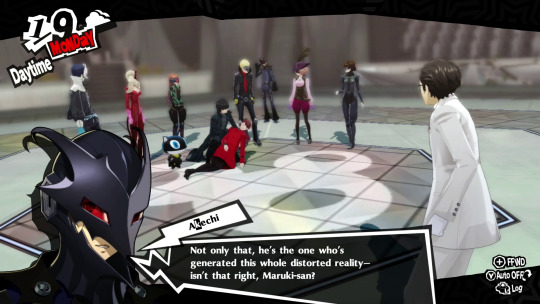
That "isn't that right" is ですよね desu yo ne, which might seem startlingly polite for third semester Akechi. In fact, he's rather consistent about his masu forms to Maruki—and only to Maruki—during the third semester.
He has no uses of desu or -masu/-masen, for instance, to anyone else in the third semester. It's actually rather cute, because it makes it clear a number of his lines in the 1/2 and 1/9 Palace are directed not to Ren or Yoshizawa, as it might seem, but to Maruki.
So this looks like a sardonic little aside, and I'm sure there's a lot of that in it—"Maruki-san". But this is also the only time Akechi ever addresses Maruki by name. And since he has all these desu and -masu forms going on around Maruki, then maybe he just calls him Maruki-san, full stop.
Did I mention he's a weird boy?
...and the downright weird
That leaves us with Yusuke, who (as nobody will be surprised to hear) does his own thing that raises some fascinating possibilities.
Yusuke only appears to address Maruki by name once, when they first meet in the courtyard, and as you'd expect, he calls him sensei—丸喜拓人先生 Maruki Takuto-sensei, "You are Dr. Takuto Maruki, correct?".
But every other time Yusuke uses sensei in the script? He's referring not to Maruki, of course, but to his sensei, Madarame. That initial approach to Maruki, stranger to stranger, face to face, is the only time he uses it to anyone else.
So what does Yusuke call Maruki? He calls him 丸喜氏 Maruki-shi.
what is shi
氏 shi is a very formal and exclusively third-person term, usually seen in writing, or heard from newsreaders. It's often translated "Mr X", which can be very odd to hear in media that retains honorifics like -san and -kun; "Mr. Akechi's coming on!" is an example, from 6/10. And Akechi is, in fact, usually mentioned as Akechi-shi on the evening news.
Yusuke's Maruki-shi is universally translated as "Dr. Maruki", as if he'd just said Maruki-sensei like everyone else. Which is a little bit of a shame.
Yusuke also uses shi for one other person—the art patron Kawanabe, in his confidant, before you meet up at the sushi bar. Most of the rest of the time, before and after, Yusuke just calls Kawanabe "Kawanabe" in third-person, with no title; he pulls out a Kawanabe-san at rank 10, after he's won the contest—face to face, of course, since shi is only third-person.
On the other hand, Yusuke never mentions Maruki at all without a title.
the other time yusuke uses sensei
Okay, I lied: Yusuke has one other instance of Maruki-sensei. This, like Morgana's single lapse into kanji, is in prompt text: "Are we going to Maruki's Palace today?" Again, I think this is likely an error.
revision history
Click here for the latest version.
v1.0 (2023/12/29)—first posted.
#persona 5#p5 meta#p5 reference#japanese language#p5 terms of address#takuto maruki#yusuke kitagawa#goro akechi#ryuji sakamoto#the squad
491 notes
·
View notes
Text

#ai girl#ai illustration#anime art#anime fanart#anime girl#cosplay#bunny girl#mai kawakami#Myriad Colors Phantom World
4 notes
·
View notes
Photo







Musaigen no Phantom World | Ep 11 | Maybe we should have just stayed at your place instead!
#musaigen no phantom world#myriad colors phantom world#haruhiko ichijou#mai kawakami#mcpwgifs#my gifs#my post
14 notes
·
View notes
Note
quais são os teus cinco livros favoritos da vida ou lidos nesse ano?
Meus cinco livros favoritos da vida:
Fantasmas - Tiago Toy
Água fresca para as flores - Valérie Perrin
Queria morrer, mas no céu não tem tteokbokki - Baek Sehee
Desventuras em Série - Lemony Snicket
Coraline - Neil Gaiman
Cheguei a ler uns 45 livros esse ano, mas vou deixar esses mesmo, são os que eu mais comentei sobre em minhas redes sociais e dei reviews gigantescas.
Livros lidos esse ano:
Rouge - Mona Awad
Peitos e ovos - Mieko Kawakami
Ervas daninhas - Lu Xun
Clarissa - Érico Veríssimo
Invocadores do Mal - Cheryl A. Wicks
Doce Tóquio - Durian Sukegawa
O Jardim Secreto - Frances Hodgson Burnett
Bom dia, Verônica - Raphael Montes
Livro da vida - Santa Teresa D'Ávila
Em agosto nos vemos - Gabriel García Márquez
87 notes
·
View notes
Text
"I'd rather have you than three meals a day.": a thematic analysis
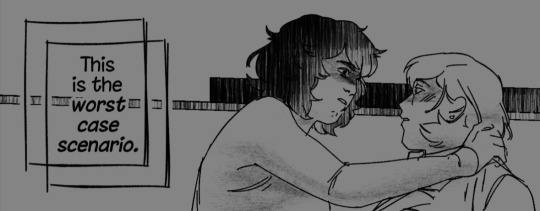
In February of 2024, a comic sprung up created by tumblr user Diesel (username rontra) based off of the Persona series. This comic, known under the title of "I'd rather have you than three meals a day." (which I will refer to as "failteacher yuri" for short), follows the story of two characters from the series: Isako Toriumi from Persona 3 and Sadayo Kawakami from Persona 5. These two characters find themselves entangled in each others' lives by complete happenstance, the comedic framing slowly revealing its fangs of intrigue and drama as more and more of both of their pasts come to light. Today, we will be discussing how the author explores themes of self-acceptance and facing one's past.
A small foreword...
As of the time I'm writing this, there are currently only 19 updates out so far of failteacher yuri, with a 20th on the way. I tried not to rush this analysis, but I also got really excited to write it! And also it's 4am!! So if I missed anything I am so so sorry...!!!
Next, I will be partially referring to characters in accordance with this chart, since this is important to the themes of the self in my opinion. Sometimes I don't specify. Bear with me a little please...
The True Self
There is the obvious point to start with, which is Toriumi accepting the fact that she is a lesbian. This is our beginning conflict in the story—quite literally in the very first page of the series—and it is the spark from which this story begins. As the story progresses, she grows more and more comfortable with her sexuality, trying more and more things with Becky.
The opening to #10 puts it quite well:
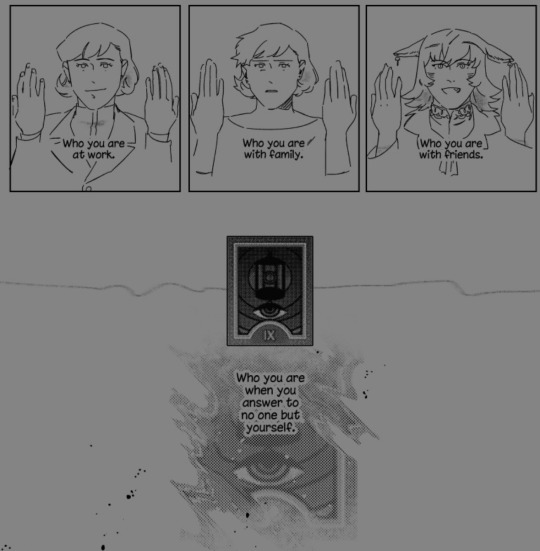
Toriumi is simply known by that when at work, a formal and polite guise. With her friends online, she's known under her username Y'ko. When fully alone, she is simply Isako. We meet her in the reverse order of this, knowing her first in a causal setting and graduating into higher grades of formality.
On Kawakami's side of things, we see that the idea of the persona is much more literal in the character of Becky. In a way, we meet her in the opposite way we need Isako, the difference between wearing the mask and having nothing to hide behind.
When she isn't under the guise of Becky and known formally at work as Kawakami, we simply are left with Sadayo. We meet her in this order, knowing her first with the mask on, watching it slowly slip as we begin to know more about her personal life.
These lines are neatly drawn for us and the characters at the start, the divide between these social masks cleanly cut. However, as time goes on and the relationship between the two deepen to new depths, the idea of the mask begins to mix with the true self, most notably in Kawakami's arc. As put nicely in #18...
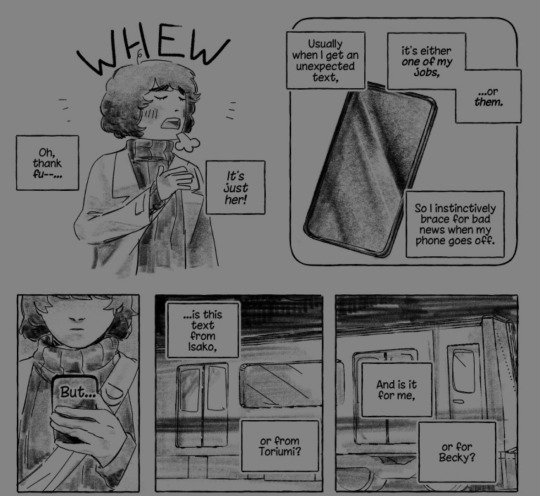
Comparisons to the Satoshi Kon film Perfect Blue have already been made by others, and even though failteacher yuri is noticeably different from the psychological horror story that the film covers, there are those elements of self-identity and the "real you" that make the comparison extremely interesting.
In the comic, it begins to grow increasingly more unclear for our characters which persona they're exactly speaking to in the moment—which words are intended for which mask, both to leave the lips of and fall upon the ears of. Which "you" is the "real you" if they all begin to feel the same—if the lines begin to blur?
The Burden of our Histories
Kawakami is the clear example of the two to start this section out with. The main thing Kawakami is hiding from Toriumi has to do with why she needs all of the money she scrambles for in the first place, which is revealed to us in #17.
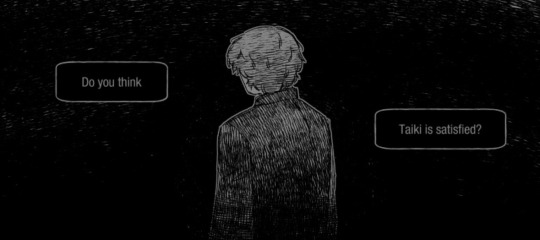
Kawakami has a secret to keep, and it's that she has been sending money to a former student's family, the student's name being Taiki. While in the comic it is unclear what may have happened to him, the usage of the word "forgive" implies that he had died, and that incident is either related to or has been blamed on Kawakami somehow.
The family demands money from her, more than her normal teacher's salary could possibly provide, so she turned to working at Victoria in order to make payments on time. With the tolls going up, though, who knows how long she can keep destroying herself...
But, of course, this isn't her only secret that she's kept. In #11, it's revealed that she took the Kanken at Level 1, the highest possible, and consequently the most difficult of all. At first, it's presented like it's an incredible feat, but this perception is shifted by Kawakami's own, believing it to have been something useless for the direction her life ended up going in.
The narration and informative boxes even begin to bend to the character's thoughts, becoming more and more unclear if the information the black boxes give in this update are objective or subjective, blurring the lines.

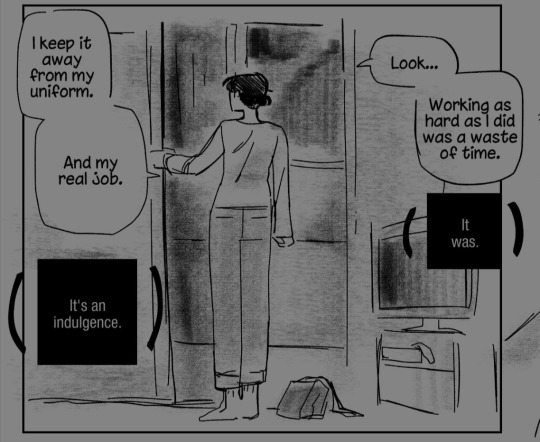
As much as Toriumi tries to hype up Kawakami and her accomplishments, the latter will simply never be able to see beyond her own self-perception.
Something that I also want to point out is how failteacher yuri utilizes onomatopoeia, creating a sense of pressure on our characters. It's almost comparable to the manga The Summer Hikaru Died, in which onomatopoeia is used to either create or alleviate tension in a scene, the sounds of the environments becoming almost deafening. The specific update from failteacher yuri I want to point towards is #18, which uses the sound of the rain in the background to create a barrier between Kawakami and Toriumi, with a side-by-side with a more recent update of The Summer Hikaru Died:
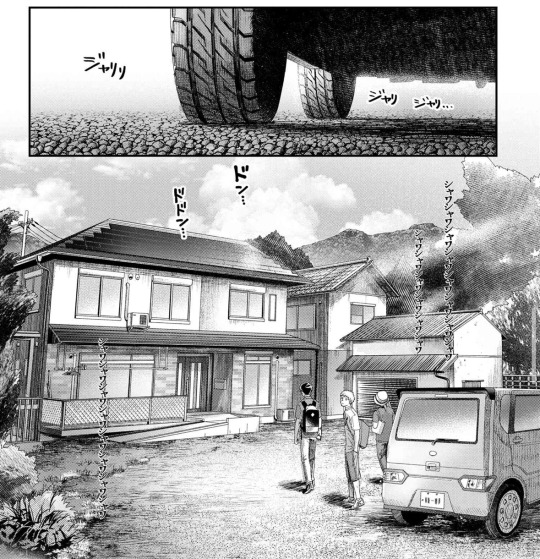
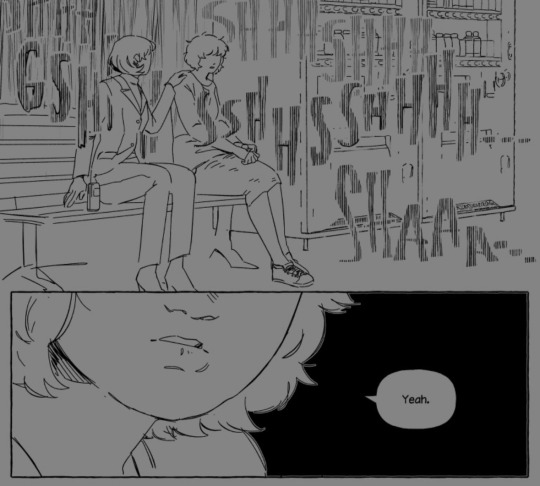
Kawakami isn't the only one keeping secrets, though. Toriumi, while much more subtle about it, is keeping a key part of her past hidden up her sleeve, and this has to do with the moon. Blink and you miss it, only overtly pointed out in update #13 and then much more quietly in #19, she continuously shows aversion to the moon, specifically the full one.
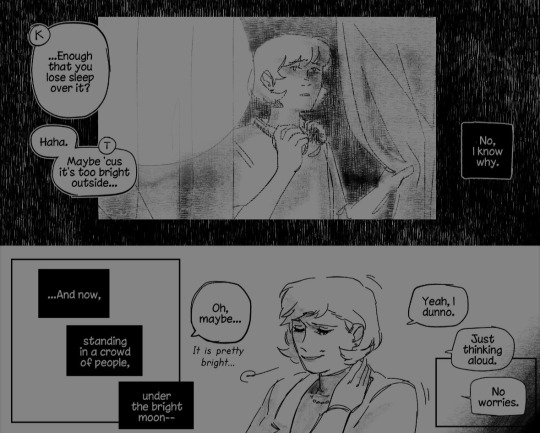
It's not like Kawakami hasn't caught on, either! During a small scene with Becky talking towards the audience at the start of #15 (the nefarious Becky is known to break the 4th wall), if you look closely, you can see that one of her notes reads "Scared of moon." I haven't played Persona 3 yet, so I can't give any fun lore insights, but what I do know is that the moon in that game is important and that Toriumi likely witnessed something she shouldn't have.
Additionally, there is also all of the stuff involving "A," which heavily has to do with Toriumi's arc of self-acceptance. Likely, something may have happened to "A" outside of Toriumi's control, and thus giving her a lot of complicated feelings about the subject. I personally don't expect a clear answer for what happened to "A," but it's still important to bring up.
Both parties are taking notice of where the other lets a part of their history slip, but neither have enough on them to be able to bring it up reasonably and not sound like they're taking crazy. Although, an inevitable tipping point is bound to be reached, especially with both of their troubles growing and growing. Something is bound to give.
How it comes together, in simple words...
Both Toriumi and Kawakami are dealing with very similar struggles, but they fight themselves tooth and nail on two different fronts, creating miscommunications and conflict between the two of them (and in some cases, outright lying). They are trying to navigate their increasingly dire presents all while their pasts haunt them, figuring things out and what they truly want from both themselves and each orher. What they want may not exactly be what they need, either, leading to further internal and external conflicts.
#13 succinctly states the ideas presented in the whole story so far, along with an amazing visual to boot:
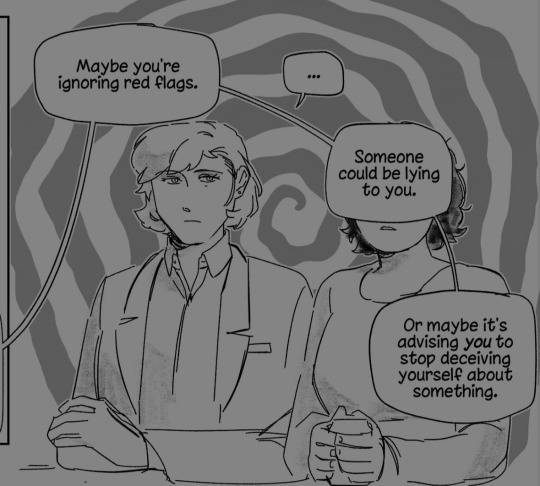
(I can't fit it here, but I highly encourage checking out the tarot meanings from #13 as well, which are linked at the end up the update, which you can view here.)
To put it simply, to lie to yourself and to others means to sacrifice, from relationships to self-perception. The only way to break free is to let go, to be your true self and to accept and face your past. The only way out is through.
#rambles#failteacher yuri NOW#I'd rather have you than three meals a day#persona#persona 5#persona 3#others art
134 notes
·
View notes
Text


川神舞 Kawakami Mai more images on patreon realistic plan https://www.patreon.com/laststardust3d
133 notes
·
View notes